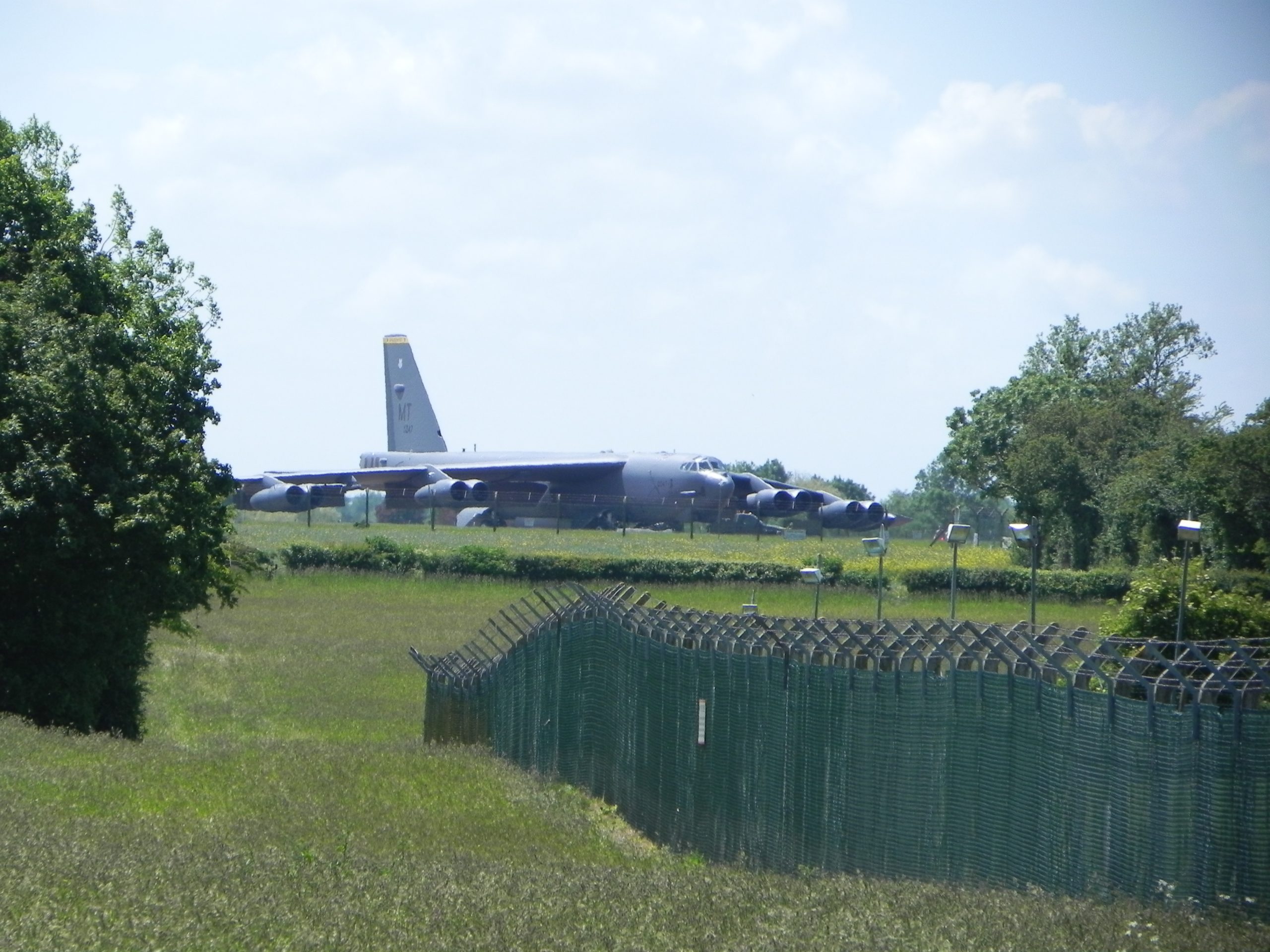US Air Force B-52 bombers at Fairford Air Base, 6th June 2015. Photo: Margaret Downs
Russia has “a sense of being surrounded and under attack” and Western nations should avoid making “unnecessary provocations”, according to Foreign Secretary Philip Hammond.
Speaking on the BBC television Andrew Marr show on 7th June Mr Hammond said there were “worrying signs” about the increased activity of Russian forces, particularly in relation to the crisis in Ukraine, but warned that the matter should be treated delicately.
The Foreign Secretary's comments came as nuclear-capable US Air Force bombers visited the Fairford military airbase in Gloucestershire to participate in a major NATO exercise close to Russian territory bordering the Baltic Sea.
Three Boeing B-52 Stratofortresses were deployed to Fairford on Friday 5th June to join the 'Baltops 15' and 'Saber Strike 15' military exercises, and were joined on Monday 8th June by two B-2 Spirit stealth bombers.
The B-2s flew from Whiteman Air Force Base, Missouri to Fairford to join B-52s from Minot Air force Base, North Dakota. Around 330 US Air Force personnel moved to Fairford as part of the month-long deployment, with activities at the base taking place round the clock in support of flights over the Baltic region.
A U-2 spy plane was also sighted at Fairford taking part in the exercise, along with US Air Force transport aircraft.
The action was intended to demonstrate the "ability of the aircraft to forward deploy and deliver conventional and nuclear deterrence anytime and anywhere," according to a US Air Force spokesperson, and reflects the importance of Fairford as a forward operating base which “can be used at a moment's notice”. Last June the Pentagon sent two B-2s and three B-52s to Fairford to take part in a similar deployment.
The NATO exercises took place close to Russian territory skirting the Baltic Sea. The Kaliningrad enclave, a small isolated area of Russian territory between Poland and Lithuania, borders the Baltic and so too does the St Petersburg seaboard in Eastern mainland Russia.
Kaliningrad is home to Russia's Baltic Sea Fleet and the Chernyakhovsk and Donskoye air bases, with thousands of Russian troops stationed there. It is seen as a key strategic and military location by Moscow.
The NATO manoeuvres are not the only action in the Baltic area which might be seen as provocative by Russia. The New York Times reported on June 13 that Washington was "poised to station battle tanks, infantry fighting vehicles and other heavy weapons for as many as 5,000 American troops in several Baltic and Eastern European countries."
NATO is also studying a request from Latvia, Lithuania, and Estonia to seek a permanent NATO presence on their soil to counter increased Russian military action in the region, amid concerns that the Kremlin may seek to inflame tensions there after the pro-Russian uprising in eastern Ukraine.
In turn, Moscow is stationing troops, armoured vehicles, military aircraft, and air defence units in Kaliningrad, and the region is rapidly becoming one of Europe's most militarized zones. Russia justifies its own military build-up in Kaliningrad as a response to an aggressive NATO, pointing to NATO expansion to former Soviet satellite states, and to the deployment of NATO troops and equipment closer to Russian borders.
Speaking about NATO – Russian relations on the BBC television Andrew Marr show on 7th June Foreign Secretary Philip Hammond said there were “worrying signs” about the increased activity of Russian military forces, particularly in relation to the crisis in Ukraine, but warned that the matter should be treated delicately.
Asked by Mr Marr if he would back plans to re-introduce US nuclear-armed missiles to Europe, Mr Hammond said: “I would need to see the detailed case for that. I haven't seen a detailed case for it”.
He said such a step might be a way to send a message to the Russian government, “but I think we have got a very delicate act to perform here”.
“We have got to send a clear signal to Russia that we will not allow them to transgress our red lines. At the same time, we have to recognise that the Russians do have a sense of being surrounded and under attack and we don't want to make unnecessary provocations.”
When pressed on whether American nuclear weapons could be based in Britain, Mr Hammond said: “We would look at the case. We work extremely closely with the Americans.
“That would be a decision that we would make together if that proposition was on the table. We would look at all the pros and the cons and come to a conclusion.”
The Daily Telegraph newspaper and some pro-nuclear hawks have interpreted Mr Hammond's comments as a warning that the UK might site American nuclear weapons on British soil in response to heightened tensions with Russia.
However, the government's formal position has been far more cautious. Responding to a Parliamentary Question from Green Party MP Caroline Lucas, Foreign Office Minister David Lidington said: “We have not been asked by the United States for such a location. If we received such a request, we would consider it on its merits in the way that successive British Governments always have done”.
